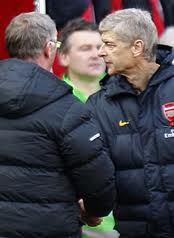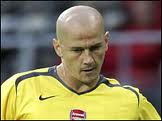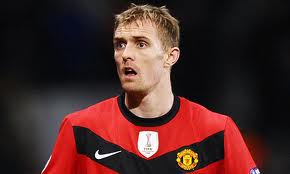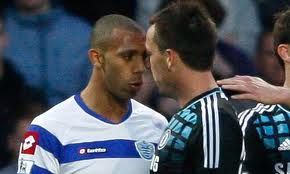The Ferguson-Wenger Wager
Most followers of English Premiership football will be well aware that Arsenal have not won any major silverware since 2005 and that Manchester United are in danger of losing dominance in their own city, let alone the whole league. Both clubs’ woes are based on squads weaker than their fans are used to supporting but hints dropped by Sir Alex Ferguson and Arsene Wenger recently in The Scotsman and L’Equipe respectively seem to suggest that this may not all be an accident.
The Ferguson-Wenger Wager[edit | edit source]
Although there are some concerns over the reliability of Sir Alex’s comments from the translation of his opaque Glaswegian, the flawless interpretation of the Frenchman’s comments seem to give the story credence. Wenger’s recent suggestions that his time at Arsenal may be coming to an end seemed to agitate Ferguson and, when questioned, it seemed there was a story going on in the background that had been kept secret for several years. Sources close to the managers have since come forward to suggest that the two of them, in a plot twist that has saved significant writing time, have entered into a wager like the one in “Trading Places” staking just one English Pound each. And the bet? It seems to be a competition to see who can leave their club with the worst squad when they depart. Apparently the official conclusion is when either man leaves their post or when either Darren Fletcher or Nicklas Bendtner win FIFA’s Balon D’Or for the World Player of the Year – needless to say, both men anticipate their departure (and, indeed, porcine aviation) before either of those players prise the award from Lionel Messi’s grasp.
Stories like this are rare and would normally be rubbished but some investigation into the recent history of the clubs shows that perhaps this is not all folly.
First Moves[edit | edit source]
At the end of the 2005 season Arsenal had just won the FA Cup and Manchester United had seen a drought of several years without a league title. Ferguson was suffering from pressure from newly-rich rivals Chelsea and Wenger could see his "Invincibles” slipping away. It is said that these circumstances led the two men into this side-game as a means of adding something extra to the rivalry of the country’s two most successful clubs of the previous ten years.
Wenger moved straight into gear on the bet and immediately sold his talismanic captain, Patrick Vieira, to Juventus. He even went so far as to ensure he received less than market value for him so as to not leave enough money in the bank to adequately replace him. Meanwhile, Wenger made sure that his transfer budget was reduced to allow more money to be invested in the club’s stadium move – insurance against the any temptation to strengthen the playing squad. Alongside this, Wenger pledged to make Pascal Cygan (an extra from Star Trek) a key part of his first team for the following season whilst discreetly offering a first team place in the long run to Manuel Almunia – a move that surprised even the hapless Spaniard himself.
Ferguson was not to be outdone. He already had the wheels to mediocrity in motion with his lethargic youth player, Darren Fletcher, being lined up as the figurehead for his team’s march to the abyss. A talentless Scot, Fletcher baffled fans and opposition alike with his awkward running, inaccurate passing and complete lack of composure in either box. His ability to turn attack into defence curried him favour with opposition managers, comedians and his team’s centre-backs who enjoyed the challenge playing with him offered. Fletcher caused most damage when employed on the right side of midfield but Ferguson knew he couldn’t play him there for long without raising suspicions that he was deliberately sabotaging his own team. Fletcher has, therefore, continued his career in the “engine room” of the team effectively breaking up United’s attacks and providing a clear route for the opposition to his own goal. Roy Keane was forced out of Manchester United when he identified Fletcher as a weak link. He is quoted as saying "I can't understand why people in Scotland rave about Darren Fletcher" – the chance that this sentiment would spread and jeopardise Ferguson’s chances in the bet were too great so the aggressive Irishman had to leave.
Fletcher is also involved in a programme to encourage "Deaf Friendly Football" for youngsters. The programme is run by the Manchester United Foundation and the National Deaf Children's Society and rumours abound that Fletcher’s commitment to the cause is fuelled by his own stone deafness – a possible explanation for his inability to make passes or sense when opposition players are approaching.
The summer of 2005 also saw Ferguson move to sign the flairless South Korean, Park Ji-Sung who dazzled fans with pointless running and an inconceivable lack of first touch. Guus Hiddink later claimed that he was amazed he managed to shift Park onto Ferguson when he was the manager of PSV Eindhoven and attributed his success in his brief spell as Chelsea manager to this transfer: “I knew as long as United had Park on the pitch, it was as good as us having twelve players” he was heard to say.
2005-06 Season[edit | edit source]
On the back of all this action, neither team performed well in the 2005-06 season and an accidental victory by the United reserves in the League Cup proved to be the only silverware that either team won. The close season provided further chance to undermine their respective squads: Ferguson levered out his goal machine, Ruud Van Nistelrooy, whilst Wenger really showed his commitment by allowing local rivals, Chelsea, to take one of his prized assets, Ashley Cole, for next to nothing. Both were happy with the business done and Ferguson felt confident that placing his trust in the inconsistent Portuguese, Cristiano Ronaldo, in lieu of Van Nistelrooy was both believable and flawed enough to significantly undermine his team’s chances for the coming years. Ferguson also shrewdly spent almost his entire transfer budget on Michael Carrick, a live statue from Covent Garden, to guarantee that pace, goal-scoring and incisive passing were not traits any of his midfielders could be accused of possessing.
2006-07 Season[edit | edit source]
The 2006-07 season saw Wenger move well ahead in the bet with Ferguson inadvertently leading his side to yet another Premiership title. The likes of Fletcher and Park just could not combat the genuine class and ability demonstrated by the likes of Ronaldo, Rooney, Vidic, Scholes, Giggs and Ferdinand. Wenger then really turned up the heat with the sale of the club’s record goal-scorer, Thierry Henry – a move that said to Ferguson “I’m mad, and I’m untouchable.” Sir Alex could only limp into the battle with the offer to Jonny Evans of first team football. The Northern Irish centre-back has since failed to age and remains a 17 year old with all the mettle, composure and concentration of an Italian politician. Ferguson did manage to tie up another large chunk of his transfer kitty on another Englishman. Once “Fergie” knew that Owen Hargreaves' career was effectively over due to tendonitis in his knees, he had his opportunity to invest a significant sum into what became an Anglo-Canadian plunge fund – much to the amusement of old foes, Bayern Munich, from whom he signed the utility player.
2007-08 Season[edit | edit source]
Disaster struck in the 2007-08 season for Ferguson’s Manchester United. Cristiano Ronaldo had discreetly become arguably the best player in the world and, when played alongside the talent of Wayne Rooney and the team’s solid defence, proved powerful enough to lead United to Premiership and Champions League glory. Sir Alex just could not believe how poor the opposition had been and his team’s attempts to undermine him by winning spiralled out of control.
Wenger had no such worries but he was aware that Cesc Fabregas and Samir Nasri were becoming influential players – an issue he would later have to deal with. He did seize the opportunity to lose Mathieu Flamini on a free transfer after having made him a key part of his first team in the previous season. Utter gamesmanship and evidence of Arsene’s Gallic flair.
Ferguson needed to act decisively to demonstrate his Scottish steel. In 2008 he waded into the transfer market with another session of “blindfold the scout” within which he sends Les Kershaw, a trusted ally, into a slum, blindfolded, to grab the first player he finds. This technique has secured the talents of the likes of Bebe, Eric Djemba-Djemba, Kleberson, Dong Fangzhuo and Mame Biram Diouf but his greatest success was when Les picked up Fabio and Rafael Da Silva – twins who to this day add a genuine insecurity to the United defence whilst providing a consistent threat of a straight red card with their mindless decision-making, lack of ball control and Stevie Wonder-like spatial awareness. Ferguson had also picked up Dimitar Berbatov in 2008 for a huge fee after having been held to ransom by Tottenham Hotspur’s miserly Chairman, Daniel Levy. This was a great moment for Ferguson who was able to break his transfer spending record on a player for whom there was no place in his team already packed with attacking players.
2008-09 Season[edit | edit source]
The 2008-09 season once again saw United pick up the Premiership title with Cristiano Ronaldo scoring at unprecedented rates. Wenger was taking control of the bet by ensuring that what quality he did have in his team was completely undone by a constantly porous defence and a merry-go-round of equally inadequate goalkeepers. His plan was working. Ferguson made the bold move to sell Ronaldo as a way of countering Wenger’s position. He had to take a huge fee for the player to avoid the risk of losing his job and, thus, losing the bet to the Arsenal manager. The sale had the desired effect with United handing their title to Chelsea, a team led by John Terry – a footballer and MOBO award winner on several occasions collaborating with his writing partners, Rio and Anton Ferdinand. Together the trio are known as the “Black C#&!s” – explaining Terry’s conversation with Anton in a recent clash with QPR.
2009-10 Season[edit | edit source]
The 2009-10 season saw United crawl to the League Title by default once again with utterly unambitious football that inexplicably could not be matched by their rivals. Ferguson was also amazed to see his side reach the final of the Champions League once again but was able to rest easy when it transpired that his opponents would be Barcelona. Ferguson offered a tour de force of tactical ineptitude by attempting to combat the threat of Xavi, Iniesta and Messi with the trio of Carrick, Giggs and Park. This was a chance for Ferguson to really revel in defeat as he stood no chance of winning anyway.
2010-11 Season[edit | edit source]
For the start of the 2010-11 season both managers knew the pressure to avoid winning the title was diminishing as Manchester City were conservatively building a team of hard-working team players in the background. With the likes of Mario Balotelli and Carlos Tevez to lead the side and Gareth Barry to provide the creative spark, City were strong favourites for the title. United did, however, stumble to the title as their local rivals faltered and the Russian-funded "Chelski" grew less fond of their manager.
2011-12 Season[edit | edit source]
Manchester City went into the season even stronger with the addition of players such as Aguero. Surely they would provide an alternative winner this season. Arsene was taking no risks though and ensured that he sold Cesc Fabregas, Samir Nasri and Gael Clichy to two of his side’s rivals at a price comfortably below the market rate. Ferguson could only attempt to combat this by installing Danny Welbeck, a journeyman forward famed for his obscure lack of pace and touch, to his team and blowing a large chunk of his transfer budget on an unproven Spanish goalkeeper.
Wenger’s transfers seemed to have had the desired effect at the beginning of the season – he even managed to mastermind an 8-2 defeat to Ferguson’s Manchester United. A real statement in the pair’s bet. Recent events seem to have baffled Arsenal’s continental spearhead with Robin van Persie failing to toe the party line by single-handedly winning a string of league and cup games. Ferguson managed to stem early season successes before they got out of hand by resting Nemanja Vidic against City and playing Jonny Evans in his stead – a defeat was almost guaranteed, the 1-6 scoreline was a bonus.
It remains to be seen how Ferguson and Wenger will cope with the threats posed by the likes of Wiltshire, van Persie, Ramsey, Rooney, Hernandez and Nani but with Wenger’s departure perhaps not being too far in the future neither manager will want to let consistency or resilience creep into their squads and jeopardise this long-standing bet.
2012-13 Season[edit | edit source]
This seasons started with a bold masterstroke from Wenger as he sold his captain and top goalscorer Robin Van Persie to his direct rival. It is believe to have been a big personal blow to Ferguson as he was outsmarted again. Wenger is though to have over priced Van Persie to other clubs and rejected their bids and then offer RVP at a cut price to Ferguson. This would not only crippling Wenger's side but also leave him with insufficient funds to find an adequate replacement. Ferguson was forced to make an offer by the board and also out of fear that he would lose the wager by being discovered. It was a big blow to Ferguson especially after Van Persie single handedly carried Arsenal into the top three last year, almost guaranteeing Manchester United unwanted success this year.
Wenger still has some serious problems to work through though in this season, with the imminent return to fitness of Jack Wiltshire and the unfortunate success of signings Santi Cazorla and Lukas Podolski threatening jeopardise Wenger's plans.




